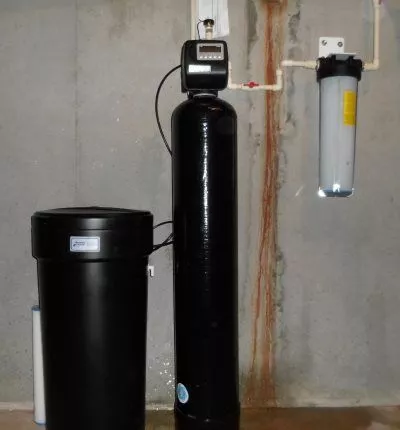We perform hard water testing in North Georgia along with our many other services. Hard water is the result of dissolved minerals such as calcium and magnesium. It is not considered a health hazard and actually contributes toward a person’s total calcium and magnesium dietary needs. However, hard water does create the following problems.
- Clothes may look dingy and may feel stiff, harsh, or scratchy due to the hardness minerals combining with soils in the clothing thus preventing them from being easily washed away. Clothes will last longer and stay brighter without these deposits trapped in their fabric.
- It prevents soaps and shampoos from working properly which could limit removal of soil or bacteria from the skin and hair. This can make hair difficult to manage and may lead to skin irritation. Soft water will reduce soap usage.
- Spotting may occur on dishes and glasses.
- Mineral deposits may form in shower stalls, bathtubs, and shower doors.
- Water using appliances such as water heaters, boilers, and dishwashers may have a shorter life span and reduced efficiency.
- May causes scale buildup in pipes and on faucets.
- May leave spots on cars after washing.
After we have performed the hard water testing these problems can be resolved in 2 ways.

The most common way is with the use of a water softener. A water softener exchanges the hardness minerals, mostly calcium and magnesium, for sodium from the softener resin. Sodium is less objectionable because it does not build up on surfaces as scale deposits. Eventually all the salt on the resin is replaced by the hardness minerals and no further exchange can take place. The resin must be regenerated with a brine solution of sodium chloride (common salt) and water. The softener is first backwashed to remove any sediment that might have built up in the resin bed. Then brine is drawn from a brine tank mixing with a separate stream of water. The brine solution flows through the resin, contacting the resin beads loaded with the hardness minerals causing them to break free allowing the sodium to attach back to the resin. Finally the softener is rinsed to remove the remaining salt and the brine tank is refilled with water to make a new brine solution. A water softener is very easy to operate as it has a pre-programmed filter head to control all of these functions. The only thing a person has to do is periodically fill the brine tank with salt.
The second way of handling hardness is through the use of a scale prevention system. This type of system does not actually remove the calcium and magnesium from the water. Instead, the water flows through a sacrificial media that attaches to the calcium and magnesium forming a crystal structure. This crystal structure is so small that it is easily flushed away with water which prevents it from building up in pipes and on surfaces. This system will require new media to be added periodically but does not use any other chemicals or salt.

